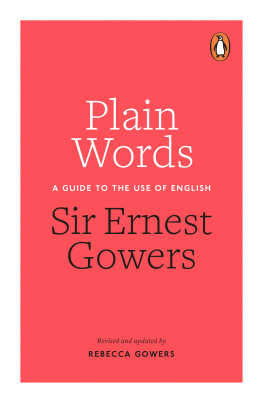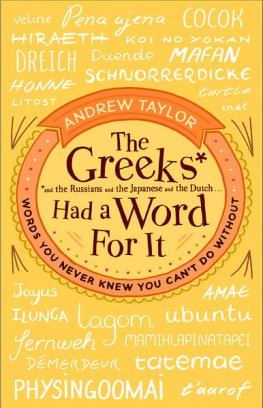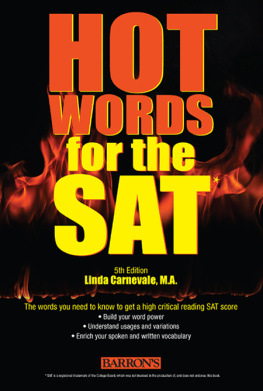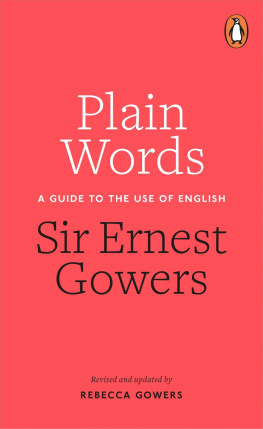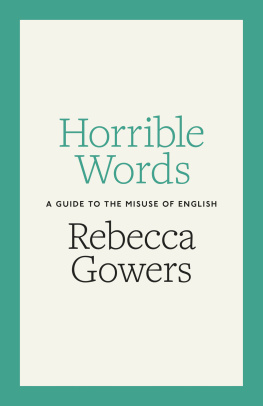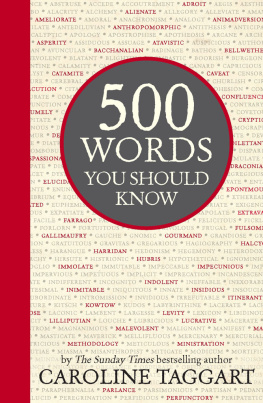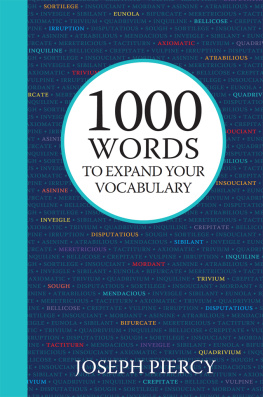PENGUIN BOOKS
UK | USA | Canada | Ireland | Australia
India | New Zealand | South Africa
Penguin Books is part of the Penguin Random House group of companies whose addresses can be found at global.penguinrandomhouse.com.
First published by Particular Books 2014
Published in Penguin Books 2015
Text revisions and updates copyright Rebecca Gowers, 2014
The moral right of the reviser has been asserted
Grateful acknowledgement is made to Faber & Faber Ltd for permission to quote from Little Gidding by T. S. Eliot
ISBN: 978-0-241-96035-6
PENGUIN BOOKS
PLAIN WORDS
Praise for the original Plain Words:
The use of commas cannot be learned by rule. Such was the opinion of the great Sir Ernest Gowers; and I have to say I find that a comfort, coming from the grand old boy himself Lynne Truss, Eats, Shoots and Leaves
The zeal with which Sir Ernest uncovers error is matched only by the wit with which he chastises it Evening Standard
Elegance, wit and good sense Gowerss main precepts are as sensible today as they were when he first presented them beneficial, intelligent and sympathetic David Crystal, English Today
One of the things that makes Gowers such an engaging figure is that he wasnt prissy, priggish or prim. As far as he was concerned, language was a living thing that was constantly changing and this was just as it should be John Preston, Sunday Telegraph
Its impact on British society was immeasurable it has never been out of print John Walsh, Independent
I am in full sympathy with the doctrine laid down by Sir Ernest Gowers Winston Churchill
Praise for the new edition:
Rebecca Gowers has been charged with producing a version which is true to the spirit of the original but adapted to the needs of the 21st century. She discharges this task with wit and delicacy Stefan Collini, Prospect
Gowerss Plain Words is a titan This new, 4th edition has had the good fortune to be edited by Gowerss great-granddaughter She has done her job with sympathy, sense and style, and she is not afraid to tease her ancestor Ross Leckie, Country Life
The book has been modernised but preserves all its original charm in the age of textspeak and the internet there is arguably a greater need for its circulation among the general public Big Issue
Plain Words should be re-issued to all public servants Eliza Manningham-Buller, Spectator
A classic and a godsend for writers of every kind Caroline Taggart
ABOUT THE AUTHORS
Sir Ernest Gowers was born in 1880, and became a leading civil servant. He ran the civil defence of London during the Second World War, chaired the 1953 Royal Commission into Capital Punishment, wrote the bestseller Plain Words, and became the first editor of H. W. Fowlers classic Dictionary of Modern English Usage.
Rebecca Gowers is the author of The Swamp of Death, shortlisted for the CWA non-fiction Golden Dagger Award, and of two novels, When to Walk and The Twisted Heart, both longlisted for the Orange Prize.
Contents
Preface
Ernest Gowers was born in 1880 into a well-heeled London family. His father, Sir William Gowers, was a celebrated neurologist, one of the founders of the discipline, whose immense body of work on the subject is today described by Oliver Sacks as matchless. But this workminute, illustrated observations of disorders ranging from syphilis to writers crampwas not the only comprehensive record he left behind. He also kept delightful accounts of all the larks and entertainments that he provided for Ernest and his siblings. They went to the river for steamer rides, to Lords for the cricket, to the Zoo to see Jumbo the Elephant, and to the Egyptian Hall for performances by the amazing automaton artist, Zoe; they took in magic displays where peoples heads were cut off, ladies disappeared and electric storms ripped round the room; they even visited the famous Wild West show, where Annie Oakley shot glass balls out of the air while Buffalo Bill commanded massed ranks of rough riders.
But these pleasures had been hard earned. William Gowerss own upbringing was impoverished by comparison. His father, a Hackney bootmaker, died when William was only eleven, catapulting the boy into a world marked by graveyards, gun shops and gelatine factories. This misfortune for the child, compounded by the death of all his siblings, seems to have led him to seize almost with desperation on whatever chances came his way. There is scant record of his early education, but he started his career in medicine aged sixteen as the apprentice of a country doctor, at the same time studying by correspondence for the London University matriculation. Diaries he kept at the time show him to have been exhausted and sometimes harrowed by this existence, one requiring an effort of will on his part of a kind we now associate with the young Charles Dickens. And it is therefore perhaps little surprise that when the time camebeyond the cowboys and elephants and other jollificationsDr Gowers would take great care over the formal education of his sons.
Ernest Gowers was sent to Rugby in 1895. He went on to read Classics at Cambridge, and in 1903 passed what was by then a genuinely competitive exam for the Home Civil Service. Though he also soon afterwards qualified as a barrister, he did not take up law. Instead, he remained in the Civil Service, advancing rapidly, until in 1911 he was appointed Principal Private Secretary to Lloyd George, then Chancellor of the Exchequer.
This was, as Gowers would later recall, a stormy period in which to take up post. Lloyd George was attempting against the odds to usher a socialist National Insurance Bill through Parliament: he faced virulent public opposition, not least from the British Medical Association and the Northcliffe Press. And getting the Bill passed was merely the start. In short order, Gowers found himself one of a crack team of young civil servants charged with the immense task of making the resulting Act work. These young men were nicknamed the loan collection because they had been drawn from across several departments, but Gowers called them a desperate remedy. Not only were they being asked to implement from scratch an entire system of health and unemployment insurance, and somehow to explain its complexities clearly to the public, but they were also being required to do so in a matter of months. Difficult as this task was, however, those to whom it had fallen would soon view it as having been good preparation for the yet greater challenges that came with the outbreak of war.

